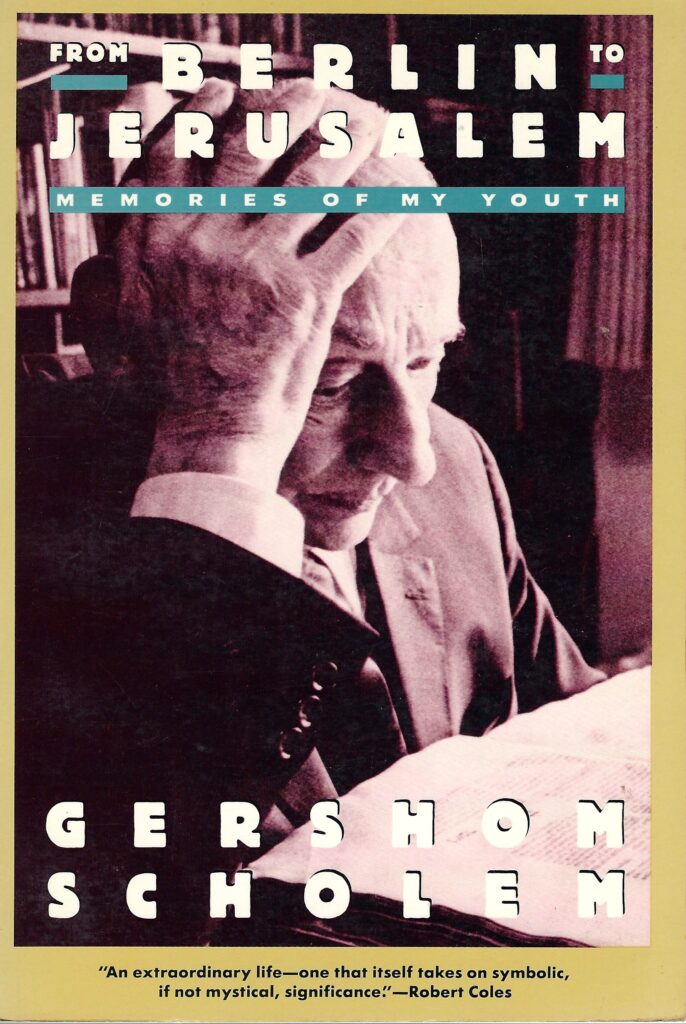Gershom Scholem, From Berlin to Jerusalem: Memories of My Youth
Schocken paperback, 1988
I first read this book eighteen years ago. So much time has passed since those Maryknoll days when I thought I wanted to go into “Jewish studies” but I didn’t have a clue, none whatsoever, until David Biale sent me back a letter after I inquired about GTU, stating their program presumes you know Hebrew.
Hebrew is a recurring theme in From Berlin to Jerusalem: Ever since the young nerd encountered the magisterial work of Graetz’s history, he decided that Hebrew was a must. And so he pursued it, even when his family frowned, the way some of my students’ families frown when they decided to embrace a more serious Islamic religiosity that entails hijab. It was Hebrew, Scholem asseverated, that would allow German Jews to regain contact with the sources of their tradition. But it was also the language of the future as well as the past: He soon made up his mind to go to Eretz Yisrael after a preparatory period in Germany. The following passages reveal (at least to me, a luftmensch adjunct) a classic Jewish scholar and intellectual:
If I ask myself whether I ever had what one might call an Erlebnis [a living experience] in my relationship to things Jewish, I can only give one answer: it was the thrill I experienced on a Sunday in April 1913 when Bleichrode taught me to read the first page of the Talmud in the original, and later that same day the exegesis by Rashi, the greatest of all Jewish commentators, of the first verses of Genesis. It was my first traditional and direct encounter, not with the Bible, but with Jewish substance in tradition. In any case, this encounter shaped my admiration and affection for Judaica more than any other subsequent experience in this field. In those years we studied five or six hours every Sunday morning, and soon Bleichrode invited me to participate in a shiur [lesson] which he held in his home for two hours on two evenings a week for a few members of his congregation and where we “learned” an entire tractate of the Talmud. (One did not study the Talmud, one “learned” it.) 47-48
The laconic brevity of those rabbis, their absolute precision of expression, attracted me even more than the same quality in the Latin writers. Added to this was the dialogue of the generations, uninterrupted for so many centuries, whose protocol is the Talmud. Here truly prevailed that “dialogic” life which the later Buber so emphatically placed at the center of his philosophy, although, paradoxically enough, he remained incomprehensibly blind to this, the most genuine evidence that Jewish tradition offered to him. The continuum of the Torah onto which all remarks of the “sages” and their disciples were projected was, in the final analysis, not a truly historical medium—the religious and metaphysical assumptions on which it was based, and with which I was later to concern myself extensively, were too evident for that—but it did have a dignity and, as I was soon to find out, problems of its own. 49
Other hunting grounds of my virtually insatiable mania for learning, reading and collecting were the book carts next to the university where it was possible… to buy for next to nothing… 50
To tell the truth, the reason I joined this [Orthodox] group was that it organized an active program in intensive courses for the study of Hebrew sources. It was possible to participate in a whole series of such courses at least five days a week from three to nine. These courses were given by students and candidates for the rabbinate, some of them excellent. 56
Between 1915 and 1918 I filled quite a few notebooks with excerpts, translations, and reflections on the Kabbalah, though these were still far from being scholarly efforts and insights. 114
In the meantime I continued my studies in the field of the Kabbalah. To deepen my knowledge of Hebrew literature I spent countless hours, particularly at night, in the library of Moses Marx, with whom I had become friends after my return from Switzerland…. On a number of occasions I stayed there from 7:00 P.M. to 7:00 A.M. and fascinatedly browsed through the several thousand volumes of his library. 143
Scholem’s an inspiring bibliophile: a collector of books and languages, a relentless reader and browser and scholar. He started young and what can I hope for, another 42 years to make amends for my slackerdom? It isn’t likely. Ah, he, of Bessie’s generation, decided to “read through the Hebrew Bible from the beginning.” I haven’t done it in English! And so, with my mild mania and undisciplined delusional thinking, I notice a daydream about going to Israel to learn Hebrew with Lynda Brayer (before she moves to Gaza), in which case I’d be living inside an I. B. Singer novel.
—12.22.2007
